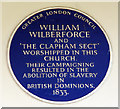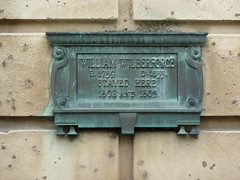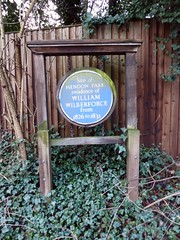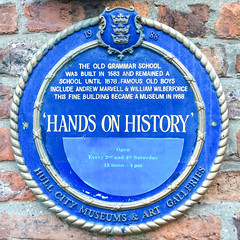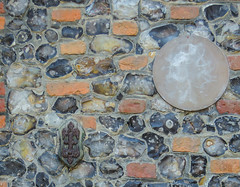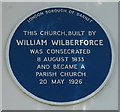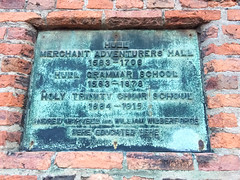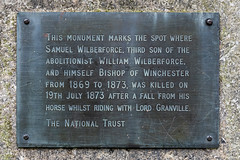William Wilberforce
Commemorated on 13 plaques
William Wilberforce 1759-1833 opponent of slavery died here
44 Cadogan Place, London, United Kingdom where they died (1833)
On the site behind this house stood until 1904 Broomwood House - formerly Broomfield - where William Wilberforce resided during the campaign against slavery which he successfully conducted in Parliament.
111 Broomwood Road, London, United Kingdom where they lived
William Wilberforce and the Clapham Sect worshipped in this church. Their campaigning resulted in the abolition of slavery in the British Dominions 1833.
Holy Trinity Church, Clapham Common North Side, SW4 0QZ, London, United Kingdom where they worshipped
William Wilberforce B.1759 D.1833 stayed here 1802 and 1805.
36 Great Pultney Street, Bath, United Kingdom where they stayed (1801) and stayed (1804)
On this site lived William Wilberforce Statesman & Emancipator 1759-1833
Southside, Merton, London, United Kingdom where they lived
Site of Hendon Park residence of William Wilberforce from 1826-1831
Highwood Hill, Barnet, London, United Kingdom where they lived (1825-1830)
The Old Grammar School was built in 1583 and remained a school until 1878. Famous Old Boys include Andrew Marvell & William Wilberforce. This fine building became a museum in 1988. 'Hands on History'
Hands on History Museum, Hull, United Kingdom where they attended school
Earlham Hall The home of the Gurney family from 1786-1912. It was visited by their many friends including Amelia Opie, Harriet Martineau and William Wilberforce. The hall dates from c 1642.
Earlham Hall, Norwich, United Kingdom where they visited
William Wilberforce 1759-1833 MP for Hull and leading campaigner in parliament for the abolition of slavery. Lived here at The Chestnuts between 1824 and 1826.
The Chestnuts, Honeycroft Hill, Uxbridge, United Kingdom where they lived (1823-1825)
This church, built by William Wilberforce was consecrated 8 August 1833 and became a parish church 20 May 1926
St Paul’s Church, The Ridgeway, Mill Hill, NW7, London, United Kingdom where they built
200 years since the Abolition of the Slave Trade in England and its Empire, we remember Reformer William Wilberforce 1759 - 1833 his long visits here, 1812, 1813, 1814 and 1825 did much for his family, his health, also for faith and schooling in Sandgate With gratitude and pride March 2007
Chichester Hall, North Lane, Sandgate, United Kingdom where they stayed (1812), stayed (1813), stayed (1814), and stayed (1825)
Hull Merchant Adventurers' Hall 1583-1706 Hull Grammar School 1583-1878 Holy Trinity Choir School 1884-1915 Andrew Marvell and William Wilberforce were educated here
Souht Church Side, Hull, United Kingdom where they was
This monument marks the spot where Samuel Wilberforce. Third son of the Abolitionist William Wilberforce, and himself Bishop of Winchester from 1869 to 1873, was killed on 19th July 1873 after a fall from his horse whilst riding with Lord Granville.
Abinger Roughs and Netley Park, Surrey Hills, Dorking, United Kingdom where they was




